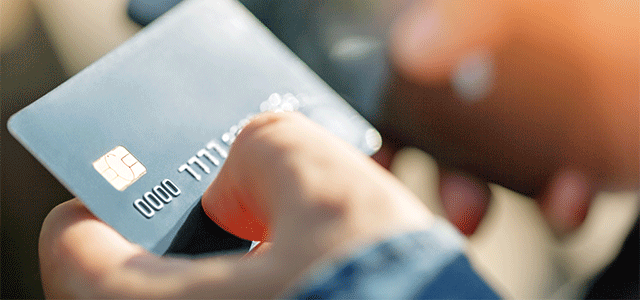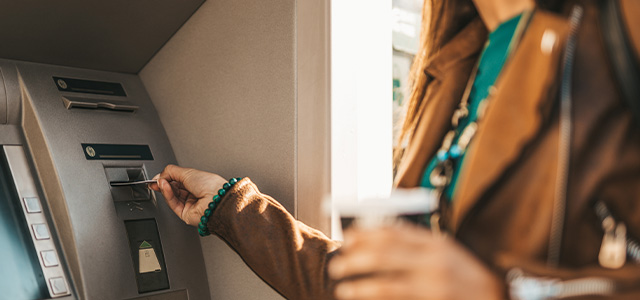Protect Yourself
Protect your Identity Everyday
- Never give your Social Security Number to anyone.
- Never give your personal information over the phone unless you initiated the call. Thieves will try to pose as legitimate businesses to trick you into giving them your information.
- Shred all statement or pre-approved credit card offers using a shredder before throwing them away to prevent dumpster divers from getting your information.
- Never leave your purse or wallet unattended, especially at the gym or restaurants, or within open view in your car.
- If you are unsure about a request from a company for personal information, contact the company directly by checking previous statement for contact information (not the statement that came with the request) and find contact information for the business on their website to make sure it’s legitimate.
Protecting your Debit and Credit Cards
- Carefully observe ATMs for fraudulent devices called skimmers. These are attached directly to the ATM card insert slot along with a camera to record your PIN.
- Watch out for incorrect receipts. When signing credit card receipts, thoroughly review, and add a 0 to empty lines such as a tip line, when you are not leaving a tip.
Check out our Debit Card Tips
Online Security- Keep computers and mobile devices up to date
Make sure you have the latest security software, web browser, and operating system. These are the best defenses against viruses, malware, and other online threats. - Set strong usernames and passwords
Your username and password should be a combination of letters, numbers, and special characters. Make sure to change your passwords at least every 90 days. - Keep personal information personal
Hackers can use social media profiles to figure out your passwords and security question answers. Lock down your privacy settings, and avoid posting information like birthdays, addresses, mother’s maiden name, etc. on your social media sites. Also, don’t post information such as your debit or credit card information. - Shop Safely
Before shopping online, make sure the website used secure technology. When you are at the checkout screen, verify that the web address begins with https, and look to see if a tiny locked padlock symbol appears on the page. - Be Cautious of Links and Attachments
Be aware of communications you receive, including those purported to be from friends and family. Be careful when clicking on links and attachments. If you have doubts or don’t recognize the sender, delete the message.
More Information from the FDIC
Additional Information for Our Business Customers
Your business is one is one of your biggest assets. It is important to take the proper steps to ensure that you protect your business from cyber thieves. This brochure details out why small businesses are targeted by cyber thieves, what you can do to protect yourself, and recommendations if your business becomes a victim of corporate account takeover.
Things You Can Do to Fight Financial Fraud
Financial fraud is one of the most devastating things that can happen to you. Financial fraud is simply the theft or embezzlement of money or any other property from a person. We recognize that you have worked hard for your money and some basic steps can be taken to protect your money and prevent you from becoming a victim of financial fraud.
Tips to Protect Yourself:
• Review your bank statement regularly and report any unauthorized transactions to your bank.
• If your account has been comprised at any time, close and re-open a new account with a new account number.
• Shred receipts, bank statements and unused credit card offers before throwing them away.
• Never give personal information, including Social Security Number, account number or other financial information, to anyone over the phone unless you initiated the call and the other party is trusted.
• Never pay a fee or taxes to collect sweepstakes or lottery “winnings.”
• Never give out information over the phone to anyone who claims to be from the IRS.
• Get to know your banker and build a relationship with the people who handle your finances. They can look out for any suspicious activity related to your account. A duplicate statement to a trusted person or family member for a secondary review is a good tool for those that have difficulty in analyzing their own statement.
• Check references and credentials before hiring anyone. Don’t allow workers to have access to information about your finances.
• Trust your instincts. Exploiters and abusers often are very skilled. They can be charming and forceful in their effort to convince you to give up control of your finances. Don’t be fooled—if something doesn’t feel right, it may not be right. If it sounds too good to be true, it probably is.
• While you may be told to not discuss with anyone, verify with someone else before you send any money. Fraudsters have called grandparents purporting to be a grandson or granddaughter who is in trouble and needs money wired immediately.
• Never let anyone take control of your home computer. Change passwords frequently.
• Order copies of your free credit report once a year from www.annualcreditreport.com to ensure accuracy.


